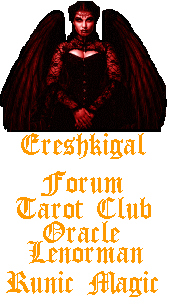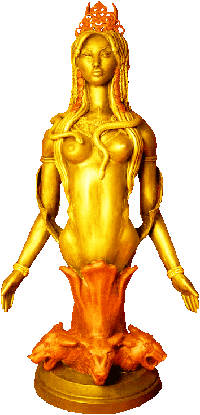Supplies for Herbal Magick.
Modern practitioners of magick believe that you can add an herb to any enchantment based on its inherent power (life force) and its associations, otherwise known as correspondences. General supplies for working with herbs include a mortar and pestle (preferably ceramic); a glass jar; a special knife that has been specifically cleansed, consecrated, and empowered for harvesting herbs and flowers; a small, wooden cutting board; and a strainer or cheesecloth. Other supplies might include small vials for elixirs, perfumes, oils, tinctures, and fluid condensers; cloth pouches for conjuring bags and sachets; needle and thread for stringing dried blossoms and herbs; cord (for hanging herbs upside down to dry); and small resealable plastic bags for storing powders, incense, and raw herbs. The most expensive item on this list is the mortar and pestle. You will also, at some point in time, need a large box or cabinet in which to keep these supplies.
Many modern practitioners also use spice grinders and food processors to grind difficult powders, nuts, fillers (such as rice), and cantankerous pieces of small bark. Read the machine’s instructions carefully, as most will not be adequate for your use and the equipment that can handle your heavy-duty work may be a bit pricey. This does not mean, however, that the mortar and pestle is abandoned. The mixture (when created in such a machine) is additionally hand ground in a magick circle with mortar and pestle, and often empowered at the same time through the clockwise grinding motion.
Modern practitioners of magick believe that you can add an herb to any enchantment based on its inherent power (life force) and its associations, otherwise known as correspondences. General supplies for working with herbs include a mortar and pestle (preferably ceramic); a glass jar; a special knife that has been specifically cleansed, consecrated, and empowered for harvesting herbs and flowers; a small, wooden cutting board; and a strainer or cheesecloth. Other supplies might include small vials for elixirs, perfumes, oils, tinctures, and fluid condensers; cloth pouches for conjuring bags and sachets; needle and thread for stringing dried blossoms and herbs; cord (for hanging herbs upside down to dry); and small resealable plastic bags for storing powders, incense, and raw herbs. The most expensive item on this list is the mortar and pestle. You will also, at some point in time, need a large box or cabinet in which to keep these supplies.
Many modern practitioners also use spice grinders and food processors to grind difficult powders, nuts, fillers (such as rice), and cantankerous pieces of small bark. Read the machine’s instructions carefully, as most will not be adequate for your use and the equipment that can handle your heavy-duty work may be a bit pricey. This does not mean, however, that the mortar and pestle is abandoned. The mixture (when created in such a machine) is additionally hand ground in a magick circle with mortar and pestle, and often empowered at the same time through the clockwise grinding motion.










 Wed 28 Jul 2021 - 8:20 by Jexxston
Wed 28 Jul 2021 - 8:20 by Jexxston













